Starting to plan a conference can feel overwhelming. It involves many tasks like event planning, promotion, and finding a keynote speaker. Having a detailed checklist can help manage stress and keep you focused on a successful event1. For help, check out Conference Planning Steps and Event Planning Guide. For personal advice, contact us at Telp: +62 21 2948 8557, Phone: +62 818 616 006 (Whatsapp), Email: hello@alcorprime.com, Office Hours: 09:00 - 18:00 (GMT +7).
Introduction to Conference Planning
Planning a conference means thinking about many things. You need to set clear goals, pick the right venue, and plan your budget. These are key steps in planning a conference1. Conferences can vary in size, from 200 people for a weekend to 15,000 for a week2.
Key Takeaways
- Develop a solid conference planning checklist to alleviate stress and stay on track.
- Understand the importance of setting clear objectives and selecting a suitable venue.
- Establish a comprehensive event budget and consider fixed and variable costs.
- Utilize technology, such as project management software and networking apps, to enhance the conference experience1.
- Start planning a conference 8-12 months before the event to ensure sufficient time for preparation2.
- Consider various conference themes and formats to cater to different audiences and preferences2.
Understand Your Conference Objectives
To plan a successful conference, you must first know your goals. This means defining why your conference matters, who it's for, and what you hope to achieve. A clear vision helps guide your decisions and keeps you focused3. Good Meeting Coordination Tips are key here, helping you stay organized and on track.
A solid Convention Strategy is vital for reaching your conference aims. You need to know who you're talking to, what you'll cover, and how much it will cost4. With these details, you can craft a detailed plan that meets your audience's needs and fulfills your goals.
Some important things to think about when setting your conference goals include:
- Defining the purpose and scope of your conference
- Identifying key stakeholders and their roles in the planning process
- Establishing measurable goals and objectives for your conference
- Developing a comprehensive Convention Strategy that aligns with your objectives
By carefully thinking about these points, you can make a detailed and effective plan. This plan will help you reach your goals and give your attendees a great experience3.
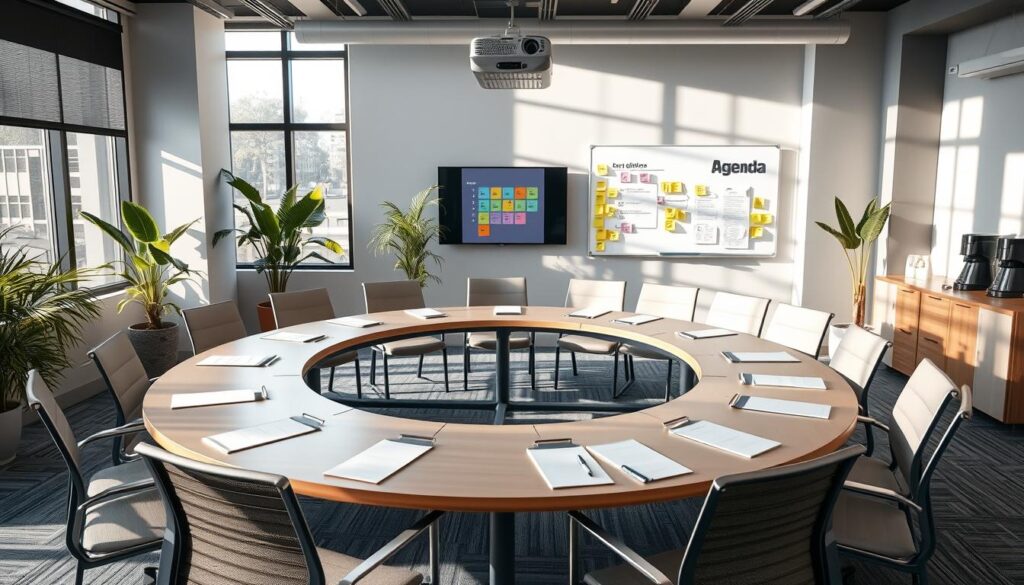
Remember, a great conference needs careful planning and attention to detail. Understanding your goals and making a solid plan will lead to a memorable event. This event will meet your attendees' needs and help you achieve your objectives4.
Set a Budget
When planning a conference, setting a realistic budget is key. You must think about many costs, like food, materials, and marketing. Also, consider venue, staff, speaker, and equipment costs5. It's wise to save 5-10% for unexpected expenses5.
To make a Conference Checklist, list your expenses and decide how much to spend. This helps you manage your budget better.
A detailed plan for Symposium Logistics should outline all costs. Speaker fees can range from $5,000 to over $100,0005. Catering costs also vary based on the number of guests5. Keeping track of your spending ensures a well-run and affordable conference.
Keep your Conference Checklist and Symposium Logistics plan up to date6. Review past budgets to plan better for future events7. This way, you can manage your budget effectively and host a successful conference.
| Expense Category | Estimated Cost |
|---|---|
| Speaker Fees | $5,000 - $100,0005 |
| Catering | Variable5 |
| Venue Rental | Dependent on location and capacity |

Select the Right Venue
Choosing the right venue for your conference is key to its success. A good venue can increase attendance and get positive feedback. On the other hand, a bad choice can lead to low attendance, negative reviews, and lost revenue8.
Think about your conference goals, who you want to attend, and what your event is about. Get advice from other event planners, those who know your industry well.
A Seminar Preparation Checklist can guide you in picking a venue. Look at location, how easy it is to get there, how many people it can hold, and what it offers. A venue close to hotels, with good transport links, and amenities can make your event better. Make sure the venue's rules fit your plans and Business Conference Timeline.
Important things to think about when picking a venue include:
- Location and how easy it is to get to
- How many people it can hold and what it offers
- The venue's rules and restrictions
- How close it is to hotels and transport
By looking at these points and thinking about your goals, you can find a venue that works for you and makes your event great9. Don't forget to check the cost and availability of things like food, sound and video equipment, and help with organizing the event10.
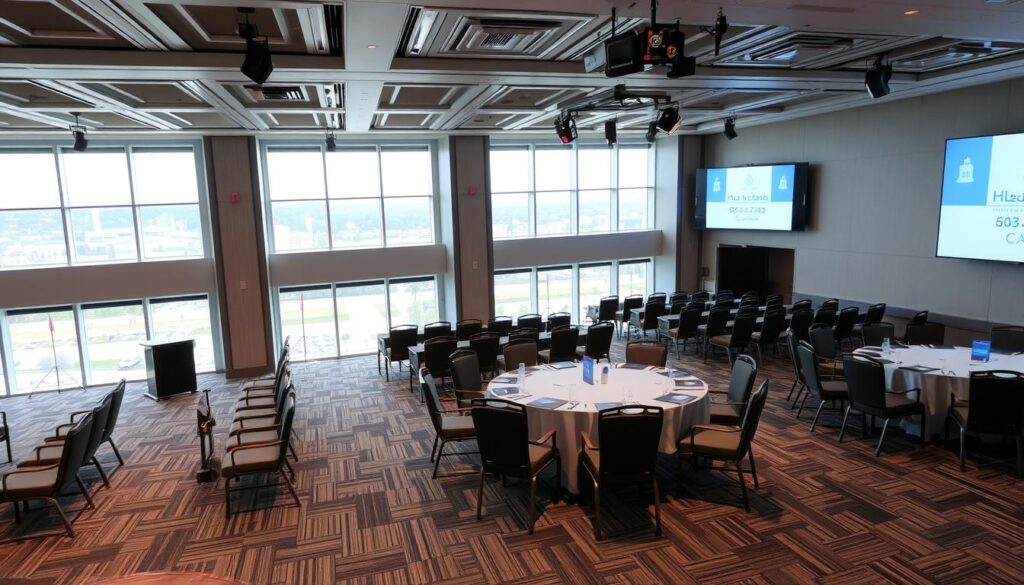
Build Your Conference Team
Starting your Conference Planning Steps means you need a strong team. They are the heart of your event. Without them, planning can fall apart. As the event manager, you must assign tasks wisely to each team member11.
A detailed Workshop Organization Plan is key. It outlines roles, deadlines, and what's expected of each team member. Good communication keeps everyone working together smoothly12.
When building your team, consider these points:
- Give roles based on what each person is good at and has experience with
- Have a clear plan for talking to each other to stay in sync
- Make sure everyone has what they need to do their job well
By following theseConference Planning Stepsand making a solidWorkshop Organization Plan, you're on track for a great conference11.

A strong team is essential for a successful conference. Spend time and effort on your team to focus on the big picture. This way, your event will be a hit12.
| Team Member | Role | Responsibilities |
|---|---|---|
| Event Manager | Overall planning and coordination | Delegate tasks, manage budget, and ensure timely execution |
| Marketing Team | Promotion and advertising | Develop marketing strategy, create promotional materials, and manage social media |
| Logistics Team | Venue management and operations | Coordinate with venue, manage catering and accommodations, and ensure technical setup |
Develop a Timeline
Planning a conference needs a detailed timeline to keep things running smoothly. Start planning a simple conference 6 months early. For a big conference with thousands, give yourself a year13. This time helps you make a checklist for every step, from the first idea to after the event.
A successful conference needs a clear plan with goals, milestones, and timelines14. Begin by listing key milestones like booking a venue and finding speakers. Then, split each milestone into smaller tasks with deadlines.
An Event Planning Guide keeps you organized and on track13. By using a Conference Checklist, you can make a timeline that fits your conference. Always check and update your timeline to stay on track with your goals.
Choose the Conference Format
Choosing the right format for your conference is crucial. It will greatly affect your event's success. You can pick from virtual, in-person, or hybrid formats. Each has its own advantages and challenges.
Virtual conferences are now more popular, thanks to the pandemic15. They're easy and affordable, reaching more people. In-person events offer real-time interaction and a deeper experience. Hybrid options mix both, but need extra planning15.
Think about your goals, audience, and budget when deciding. Meeting Coordination Tips advise considering engagement levels and technical needs. For example, virtual events need a good online platform, while in-person ones require venue and catering planning. A solid Convention Strategy will help you use your chosen format effectively.
Important factors to weigh include:
- Attendee preferences and expectations
- Budget and cost constraints
- Technical requirements and infrastructure
- Level of engagement and interaction desired
By carefully evaluating these points and your goals, you can pick the best format. Don't forget to segment fees and create urgency in your messages to boost attendance15. With the right format and planning, your event will be memorable and engaging.
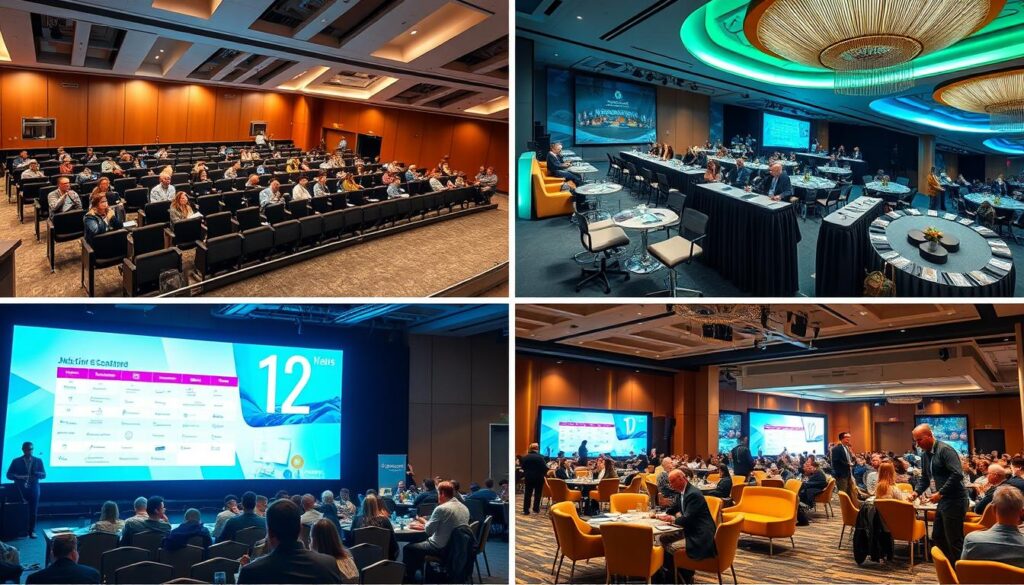
Determine Your Target Audience
When planning a conference, knowing who your audience is is key. You need to create profiles based on who they are, what they do, and what they like16. This way, you can make sure your conference meets their needs, making it more enjoyable for everyone. A good Seminar Preparation Checklist and Conference Planning Steps can help you get this right.
It's important to know who you're talking to when promoting your event16. You can use tools like Facebook Audience Insights and Google Analytics to learn about your audience16. Knowing what they like and how they like to get information helps you plan better venues and content16. It also helps you make your event marketing more effective16.
Some important things to think about when figuring out your target audience include:
- Demographic data from CRM, market research, LinkedIn, and business directories16
- Understanding their interests, needs, habits, and resources16
- Collecting data during planning to improve future events and automate tracking16
By following theseConference Planning Steps and making a detailedSeminar Preparation Checklist, you can make your conference a hit with your audience16.

Create a Compelling Agenda
When planning a conference, a good agenda is key. It keeps your audience engaged and the event running smoothly. A well-made agenda ensures everything goes as planned and meets your goals17.
To begin, list your session topics and who will speak. Don't forget to include breaks and chances for networking. This mix makes for a fun and informative experience for everyone.
Understanding your audience is crucial. Tailor your content to meet their needs. Plan the event's timeline, decide on its length, and figure out session times18. Break your agenda into different parts, like opening and closing sessions, to keep things interesting. Choose speakers who are both knowledgeable and engaging for your audience17.
Some important things to include in your conference program are:
- Organization's name and details
- Conference topic, theme, title, and tagline
- Agenda listing events, speakers, timings, and locations
- Venue details, such as name, address, parking, and transit options
Adding these details helps attendees move around easily. It also makes your Event Planning Guide complete18. Good Symposium Logistics means thinking about the event's length, session times, and leaving room for transitions19.
By following these tips, you can host a successful and engaging conference. It will meet your goals and give your attendees a great experience.

| Session Type | Duration | Speaker |
|---|---|---|
| Opening Session | 30 minutes | Keynote Speaker |
| Main Session | 60 minutes | Panel Discussion |
| Interactive Session | 45 minutes | Workshop Facilitator |
Market Your Conference Effectively
To make your Business Conference Timeline a success, you need a solid marketing plan. Start by setting clear goals, like boosting event attendance by a certain percentage20. Plan your marketing efforts with key milestones, such as launching campaigns and sending emails20.
Using social media is crucial for marketing your conference. Since 84% of top buyers are influenced by social media21, having a strong online presence is key. Tools like Hootsuite or Buffer help keep your social media consistent20. Also, creating content like blog posts and videos can draw in attendees20.
Email campaigns are also vital for marketing your conference. Email is 40 times better at getting new customers than social media21. Use email marketing tools to make your content personal, which can boost conversion rates by up to 10%21. Following these steps and planning well can lead to a successful conference.
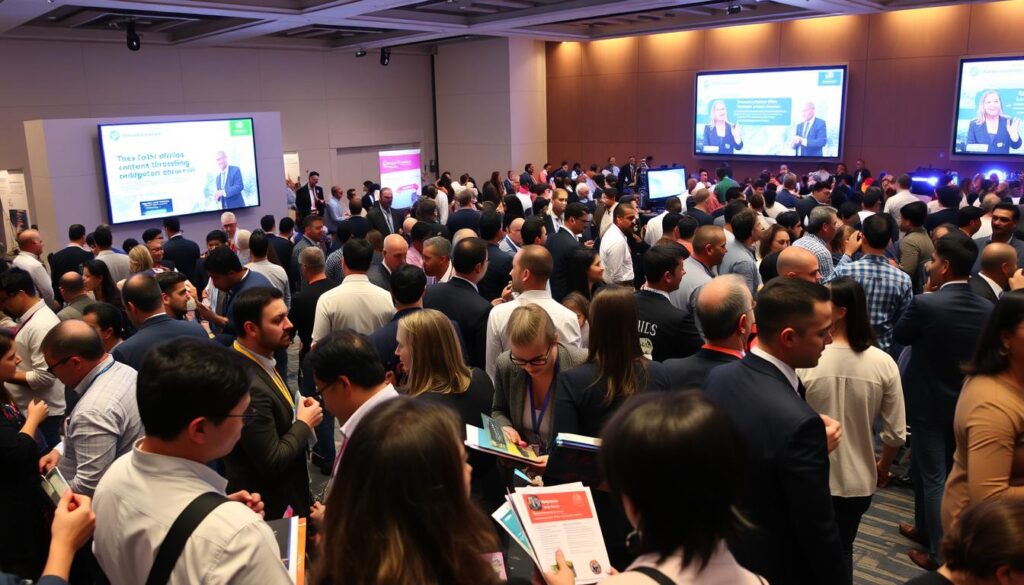
Using a multi-channel marketing approach helps you reach more people. This means using platforms where your audience is active and working with industry partners20. With the right strategy, your conference can be a hit and meet your goals.
Secure Speakers and Presenters
Planning a conference means finding top-notch speakers and presenters. You need to research and invite speakers who fit your event's theme and goals. A detailed Seminar Preparation Checklist keeps you organized and ensures you get the right speakers. Getting quotes from vendors to compare prices is key22. This helps you make smart choices and stay on budget.
To find great speakers, look at your network for key stakeholders and experts. You can also search for speakers who have spoken at similar events. After making a list, invite them to your conference. Make sure to give them all the details about the event, audience, and tech needs. This helps them prepare and give a top-notch presentation.
When coordinating speakers, think about the different types of conferences out there. There are corporate, academic, medical, tech, nonprofit, and government events23. Effective Meeting Coordination Tips include negotiating fees, setting up easy registration, and getting feedback after the event. By following these steps and using a detailed checklist, your conference will be a success. Don't forget to include a budget for unexpected costs22. With careful planning, you can get speakers who will engage and educate your audience.
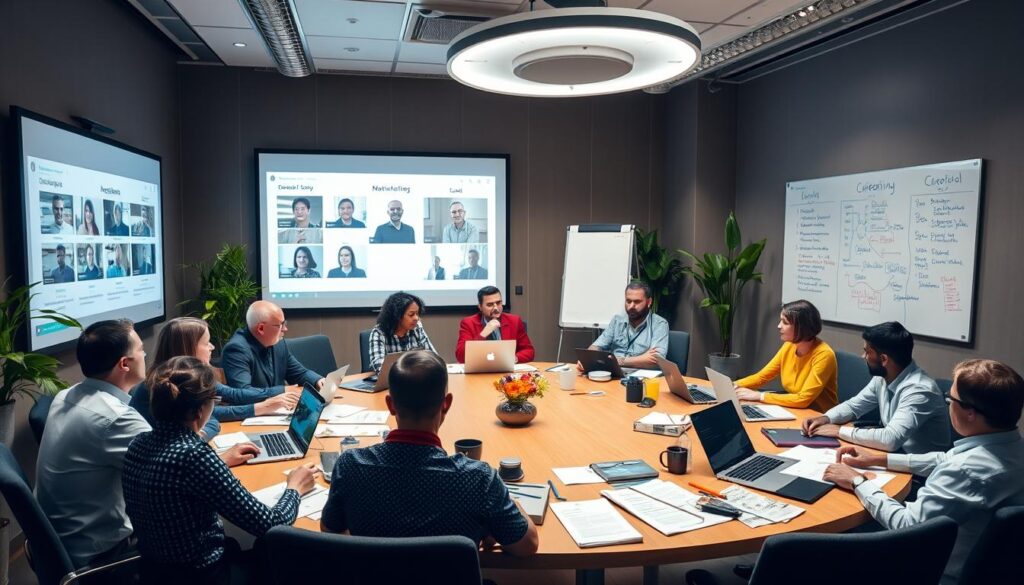
Manage Registrations
Having a solid Conference Checklist is key for a smooth registration process. Pick a registration platform that's easy to use, secure, and fits your Workshop Organization Plan24. It should send out automated confirmation emails and track attendee data and feedback25.
When picking a platform, think about payment options, mobile-friendliness, and participant accounts25. This makes the event better for everyone. Also, add Registration Terms and Conditions to the form to set clear expectations and protect your organization25.
A good registration process is vital for your conference's success. With a detailed Conference Checklist and a solid Workshop Organization Plan, your attendees will have a great time from the start. The right platform and focus on engagement will help your conference succeed24.
Some important things to consider for managing registrations include:
- Choosing a registration platform that integrates with your Workshop Organization Plan
- Providing automated confirmation emails and tracking attendee data
- Offering mobile-friendly registration options and participant accounts
- Including Registration Terms and Conditions to clarify expectations
Prepare for On-Site Logistics
As you near the end of planning your conference, focus on the Event Planning Guide for a smooth experience. Good Symposium Logistics are key to a successful event. Arrive a day early to manage pre-event tasks and setup26.
This lets you meet with venue staff and important people. Roles like Convention Services Manager and Chef will be there26.
Make a daily plan with your team's tasks26. Make sure all speakers are ready 30 minutes before the event starts. Also, get headcounts from the Banquet Manager after meals26.
Review banquet checks each day and note any issues for later26. Knowing the 5 Cs of event logistics helps plan better27.
Good communication and tech, like video calls and event software, improve logistics27. By following these tips, your event will run smoothly and be enjoyable for everyone.
Organization and planning are crucial for event success27. With careful planning, your conference will be memorable and successful.
Execute Your Conference Plan
When you start your conference plan, it's key to watch everything closely. Make sure everything goes as planned28. Know the conference program and the floor plan well. This helps all staff members work smoothly together28.
Good Conference Planning Steps mean knowing why you're having the conference. You should also set clear goals and know who to invite. This is vital for a great event29.
A good Convention Strategy has a detailed plan, a budget, and a clear way to communicate30. It's smart to have a team from different areas like marketing and finance. This makes planning easier29.
With a solid plan, you can host a conference that everyone will enjoy. It will meet the needs of your guests.
Some important things to think about when you're executing your plan include:
- Make sure the registration process is easy and offers many payment options29
- Have a smooth check-in process and enough staff for registration28
- Keep an eye on vendors and work well with the venue staff29
By following these tips and keeping your goals in mind, you can make a conference that people will remember. It will meet your goals and make your guests happy30.
Evaluate Conference Success
Now that the conference is over, it's time to see how it did. This step is key to making your next event even better31. Start by asking your attendees and staff for their thoughts through surveys and interviews. This will give you a full picture of what worked and what didn't32.
Then, check if your goals were met31. Use a balanced scorecard to look at things like money, customer satisfaction, and learning31. This will show you where to improve for the next time.
After that, dig into the data31. Use numbers and charts to find important insights and compare to others in your field31. This detailed look will help you make your future conferences even better32.
Remember, the secret to a great conference is learning and getting better. By carefully checking your event, you'll be ready to make your next one even more engaging and meaningful for your guests.
If you need help planning your next conference, our team at Alcorprime is here for you. We can offer advice and support every step of the way. You can reach us at
FAQ
What are the essential steps for planning a successful conference?
Planning a successful conference involves several key steps. First, understand your goals. Then, set a budget and choose a venue. Next, build a team and create a timeline.
Decide on the conference format and who to invite. Make a compelling agenda and market your event well. Lastly, find top-notch speakers.
Why is it important to define the purpose of the conference?
Knowing the purpose of your conference is vital. It guides all your planning decisions. A clear purpose helps you know who to involve, set goals, and ensure the content fits your aims.
How do I create a realistic budget for my conference?
To make a realistic budget, start by setting a total budget based on expected income and resources. Then, divide the budget into areas like venue, food, speakers, marketing, and emergencies. Always plan for unexpected costs.
What factors should I consider when selecting a venue for my conference?
When picking a venue, think about its location and how easy it is for people to get there. Also, check if the venue can hold your number of guests and if it has the right amenities. Look at any venue rules that might affect your plans.
How do I build an effective conference planning team?
To create a great team, assign roles based on people's skills and experience. Make sure everyone knows how to communicate well. Give them the training and tools they need to do their jobs well.
How do I create a comprehensive timeline for my conference planning?
For a detailed timeline, make a checklist of all planning tasks. Identify important milestones to break down the work into smaller parts. Be ready to adjust the timeline if needed to handle challenges or new opportunities.
What are the advantages and disadvantages of different conference formats?
There are three main formats: virtual, in-person, and hybrid. Virtual events are easy to access and save money but might not be as engaging. In-person events offer a deeper experience but cost more and need more planning. Hybrid events mix the best of both but are more complex to set up.
How do I identify and understand my target audience for the conference?
To know your audience, create profiles based on who they are, what they do, and what they're interested in. Make sure the content and format of your conference meet their needs. Also, aim for diversity and inclusion to welcome everyone.
What should I consider when creating the conference agenda?
When making the agenda, choose topics and speakers that fit your goals and appeal to your audience. Make sure there are breaks and chances for networking. Mix up the types of sessions, like keynotes and workshops, to keep things interesting.
How do I effectively market my conference?
To market your conference well, have a solid plan that matches your goals and audience. Use social media and email to reach more people and keep them interested.
Source Links
- https://www.congresscentre.co.uk/conference-planning-guide-for-beginners/
- https://bloomerang.co/blog/conference-planning/
- https://dexonsystems.com/blog/conference-planning
- https://swoogo.events/blog/conference-planning-checklist-for-first-time-planners/
- https://www.attendeeinteractive.com/blog/budget-for-conference-planning/
- https://swoogo.events/blog/how-to-create-a-conference-planning-checklist/
- http://ncraao.org/conference-planning-guide-budgeting-process/
- https://www.ovationsquare.com/blog/event-management-six-steps-to-selecting-the-venue
- https://www.imagovenues.co.uk/go-perform/top-tips-for-choosing-your-perfect-conference-venue/
- https://www.linkedin.com/pulse/conference-planning-8-essential-tips-selecting-venue-sanchez-blunt-mfimc
- https://www.eventmobi.com/blog/how-to-plan-a-conference/
- https://www.exordo.com/blog/your-foolproof-conference-planning-checklist/
- https://iccbelfast.com/blogs/conference-planning-guide
- https://www.wildapricot.com/blog/conference-planning
- https://fourwaves.com/blog/how-to-plan-your-scientific-conference/
- https://www.linkedin.com/pulse/first-step-event-planning-understanding-your-target-kortney-phillips
- https://www.eventbookings.com/blog/how-to-create-an-event-agenda/
- https://www.wildapricot.com/blog/conference-agenda
- https://asana.com/resources/meeting-agenda
- https://theeventscalendar.com/blog/event-marketing-plan/
- https://marketmemore.com/blog/conference-marketing-strategy
- https://www.theconciergeclub.com/blog/conference-planning-checklist
- https://www.vfairs.com/guides/conference-management/
- https://meetinghand.com/blog/ultimate-checklist-for-conference-planning
- https://meetinghand.com/blog/how-to-manage-event-registrations-efficiently
- https://www.executivevents.com/resource/on-site-logistics-prior-to-start-of-conference
- https://inevent.com/blog/others/how-to-plan-and-execute-event-logistics-for-a-successful-event.html
- https://www.ncjrs.gov/ovc_archives/reports/confguid/execplan.htm
- https://swoogo.events/blog/conference-management-guide/
- https://www.projectmanager.com/training/meeting-planning-6-steps
- https://www.linkedin.com/advice/1/how-do-you-evaluate-effectiveness-conference-during-0lgdc
- https://www.amworldgroup.com/blog/how-to-plan-a-conference-a-step-by-step-guide





